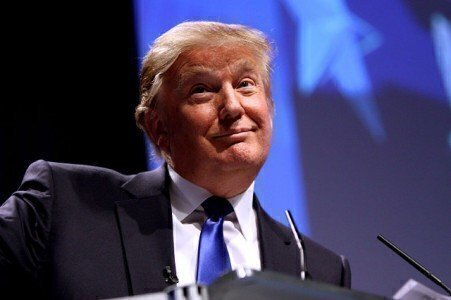Presidential candidate Donald Trump’s broad comments about restricting Muslim access to the United States have drawn a lot of attention, especially among constitutional scholars. So what are the core issues behind these arguments?
 With many things said by the New York businessman, Trump’s statement is general and open to interpretation.
With many things said by the New York businessman, Trump’s statement is general and open to interpretation.
Link: Read the Statement
“Donald J. Trump is calling for a total and complete shutdown of Muslims entering the United States until our country's representatives can figure out what is going on,” said in a campaign statement. In the statement, Trump didn’t specific if the executive or legislative branch would take the lead in such actions.
In a later interview, he told several TV outlets he envisioned tactics similar to those used during the Roosevelt administration during World War II.
“What I’m doing is no different than FDR,” Trump said on ABC. “If you look at what he was doing, it was far worse … and he’s one of the most highly respected presidents — they name highways after him,” Trump said.
And again, in South Carolina, Trump told an audience assembled to commemorate Pearl Harbor that his idea wasn’t different that the Roosevelt-era decisions to isolate some ethnic Japanese, Germans and Italians during the war.
"This is a president who was highly respected by all … If you look at what he was doing, it was far worse,” Trump said. "We are now at war," Trump added, “We have a president who doesn't want to say that."
Among the scholars, a common understanding was that candidate Trump wanted current political leaders to block the entry of all believers of the Muslim faith into the United States, until a solution could be found to prevent terrorist attacks related to ISIS and other groups.
“This would not only violate international law, but do so by embracing open discrimination against one religion. It would make the United States a virtual pariah among nations,” said Jonathan Turley from George Washington University told the Washington Post.
There were several common themes voiced by Turley and other constitutional scholars interviewed by major media outlets. These centered on the First Amendment ‘s religion clauses, the concept of Due Process, and the United States government’s international legal commitments.
"I believe Trump's unprecedented proposal would violate our Constitution," said Harvard Law’s Laurence Tribe told NBC News, citing the First Amendment's Religion Clauses and the equality dimension of the Due Process Clause of the Fifth Amendment." Tribe also cited the Constitution's “no religious test” clause as a factor.
But others have pointed to the Korematsu decision which Trump allude to, and past Congressional acts that barred ethnic Chinese from American soil as signs that similar things have happened in American history.
"To the extent there are precedents for this kind of blanket discrimination," Jenny Martinez from Stanford Law told NBC, "they are ones, like the Japanese internment camps upheld by the Supreme Court in Korematsu, which all reasonable constitutional experts consider tragic mistakes that we should not repeat."
The Chinese Exclusion Acts, passed by Congress and signed into law by President Chester Alan Arthur in 1882, at first barred Chinese laborers from entering the United States, and restrictions were expanded to many ethnic Chinese, regardless of nationality, in subsequent laws. The Magnuson Act of 1943 and the Immigration Act of 1965 finally removed these restrictions. Several significant legal decisions upheld the legality of the Exclusion Acts.
The Korematsu decision involved the legality of Presidential Executive Order 9066, which was issued in early 1942 by President Franklin D. Roosevelt after fears generated by the Japanese attack made the safety of America's West Coast a priority. The decision ruled on the ability of the military, in times of war, to exclude and isolate minority groups. “It should be noted, to begin with, that all legal restrictions which curtail the civil rights of a single racial group are immediately suspect. That is not to say that all such restrictions are unconstitutional. It is to say that courts must subject them to the most rigid scrutiny. Pressing public necessity may sometimes justify the existence of such restrictions; racial antagonism never can,” Justice Hugo Black said in a majority opinion.
To date, the Korematsu decision hasn’t officially been overturned by the Supreme Court, but it has been heavily criticized.
Justice Antonin Scalia, speaking at an event in Hawaii in 2014, said Americans shouldn’t assume that another Korematsu situation couldn’t occur in a wartime situation. “You are kidding yourself if you think the same thing will not happen again,” Scalia said, citing a Latin phrase meaning, “in times of war, the laws fall silent.”
“That’s what happens. It was wrong, but I would not be surprised to see it happen again—in time of war. It’s no justification but it is the reality,” Scalia said.
In broader terms, scholars point to the First Amendment, the Fifth Amendment and international legal agreements as problematic when it comes to Trump’s broad plan, especially when a religious group is targeted. But there are precedents were legal actions, not overturned by the courts, restricted immigration and allowed the incarceration of American citizens, based on ethnicity, during times of war.
The debate, surely, will not go away in the near future, with the anniversary of the Korematsu decision coming up on December 18th.






